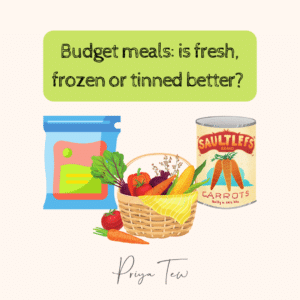With the cost of living increasing, including food costs it can feel expensive to buy fresh fruit and veggies all the time, especially if they end up lurking in the bottom of the fridge and not being used up in time. I’m here to tell you today that frozen fruit and vegetables are a cost-effective, simple alternative for some days of the week. I’ve a freezer stocked up with all kinds of varieties. It saves me time in the week as there is less food prep to do and I can have a little bit of everyones favourites on the table.
You may have noticed an explosion in the types and styles of frozen vegetables on offer these days. From butternut squash to corn on the cob and marinated veggies plus edamame beans too. We tend to stick to the basics ranges in out house but it’s nice to have some more exciting items to add to the mix too.
Benefits of fruit and veg
Using frozen and tinned vegetables can be a great way to have nutritious food and one of your 5 a day, and is budget-friendly too. At the time of writing this I can get a 1kg bag of frozen peas for 61p and green beans are £1 a kg frozen compared to £6 a kg fresh. Whilst the texture is a little different with the frozen forms I do think they make a good alternative for quick meals.
Consuming more fruits and vegetables is recommended as part of a balanced diet. UK guidelines recommend having 5 mixed portions of fruit and veg each day, and certain dietary protocols like the DASH diet suggest having more. Fruits and vegetables contain a variety of beneficial nutrition, such as antioxidants and fibre. Having enough fruit and vegetables may be protective against heart disease and even certain cancers.
Frozen or fresh?
Many frozen foods are frozen within a few hours of being picked, meaning that they can maintain more nutrition than some fresh foods that can take days to get to supermarket shelves. Similarly, canned and tinned vegetables also preserve their nutrition. Studies show us that frozen vegetables retain their vitamin content and these can be higher in nutritional value then those items sat in your fridge for a week.
This means that frozen and canned foods can be just as nutritious -or even more so -than fresh and so can be a convenient option. These foods are often more budget friendly too, both because they can be cheaper than fresh to buy, especially for out-of-season foods and because they last longer. However do a price comparison as when fresh fruits and veggies are in season and on offer they can be cheaper too.
Don’t forget you can also grow your own, then cook and freeze them to eat later in the year. Green beans, carrots and spinach can be easy items to grow in pots and freezer down.
Having tinned and/or frozen produce in the kitchen can also make mid-week meals easier. Even if you’ve run out of fresh vegetables between food shops, having a few options in the cupboard or freezer means you can make varied and nutritious meal options.
Some tips on how to include tinned and frozen foods:
- Add mixed frozen veg to stir fries and egg fried rice
- Make smashed peas on toast as a higher-protein alternative to avocado toast
- Use frozen berries and spinach in smoothies
- Add tinned beans and corn to a chilli
Ultimately having a range of fresh, frozen and tinned fruit and vegetables is the way to go, as this study suggests. This gives you diversity of plants foods for your gut health, it brings you the best nutrition benefits and you have the convenience too.
